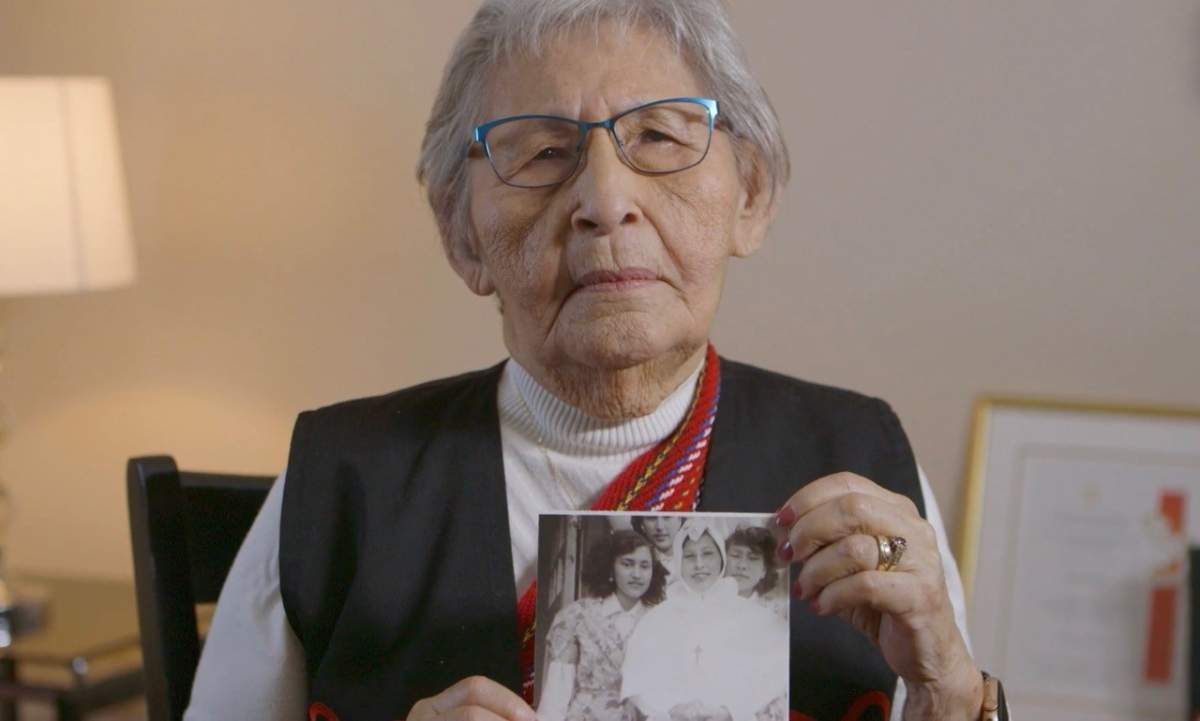

By Krysia Collyer &
Neetu Garcha
Global News
Published June 11, 2022
6 min read

For all who know elder Angie Crerar, they know one thing for sure: she’s a force. The 85-year-old is a well-known figure in Grande Prairie, Alta., and today she’s making a stop by the mayor’s office to drop off a gift.
Crerar hands Mayor Jackie Clayton a rosary that Crerar brought home from her trip to the Vatican.
The two women embrace and the mayor thanks her.
“How was your trip?” asks Clayton.
“Unbelievable,” Crerar answers.
In March, Crerar, who is a member of the Métis Nation of Alberta, was part of the Indigenous delegation that travelled to Rome to meet with Pope Francis.
Crerar survived a decade in residential school and she wanted to tell the head of the Roman Catholic Church about the brutality and humiliation she faced.
“We told our story to our Pope. We told him the hardships of the pain. The horrors … sexual, mentally … and your soul,” said Crerar, who is also Catholic.
She was eight years old when she and her two younger sisters were forcibly removed by the RCMP and taken to St. Joseph’s residential school in Fort Resolution, N.W.T.
For decades since, Crerar has felt guilty for not being able to protect her younger sisters from the abuse they faced at the hands of the nuns and priests running the school.
She explains she has “scars all over my body” from trying to protect her sisters.
But since Crerar has returned home from the Vatican, she has felt “free.” She says the visit and the Pope’s historic apology gave her a sense of relief.
“It brought me … my peace. I thank the Lord for that…. I needed that,” she told Global News’ The New Reality.
Delegates from Inuit, First Nations and Métis communities had private meetings with Pope Francis to discuss the legacy of and abuses they experienced in the Catholic-run residential schools in Canada.
During a final audience on April 1 to the entire delegation, the Pope delivered a historic apology.
“I want to say to you with all my heart: I am very sorry,” he told the delegates.
He also expressed his sorrow and shame “for the role that a number of Catholics, particularly those with educational responsibilities, have had in all these things that wounded you, in the abuses you suffered and in the lack of respect shown for your identity, your culture and even your spiritual values.”
Most people in attendance, including Taylor Behn-Tsakoza, were “shocked” by the apology.
“I went there not expecting an apology because I wanted him to make an apology in Canada,” said the youth delegate.
From Fort Nelson First Nation in B.C., Behn-Tsakoza is Eh Cho Dene and Dunne Zaa. As an intergenerational survivor, she wants to make change for future generations, to carry on a “legacy of healing.”
She has witnessed first-hand the long-lasting impact residential schools can leave. Her aunts and uncles were sent to Lower Post residential school in B.C.
Her father was forced to attend an Indian day school. Day schools were also used as tools of assimilation by the federal government against Indigenous children. But unlike residential schools, students went home to their families in the evenings.
“Just seeing them struggle every single day to be proud of who they are and where they come from, it’s hard,” Behn-Tsakoza said.
While some Indigenous people think the apology made at the Vatican is an important step, they also believe a full apology must happen on Canadian soil in July when the Pope visits to have real significance. There are other Indigenous people who don’t accept the apology at all.
Grand Chief Joseph (Joe) Manuel is one of them. He is a survivor of the Kamloops residential school and he believes the only way to heal is through criminal accountability.
“I could never accept … an apology,” he told The New Reality. “It’s a heinous crime that should be dealt with accordingly.”
Manuel wants members of the church who are still alive and perpetrated criminal acts against children to be charged because “no one is above the law.”
So far, the vast majority of abusers have not been held to account.
In 2015, the Truth and Reconciliation Commission (TRC) released a report identifying more than 38,000 claims of abuse in residential schools. But the commission was only able to find fewer than 50 convictions.
That’s why Manuel wants to use the law and have the justice system conduct criminal investigations into the allegations.
“I can’t wait to get to court,” he said.
The calls for justice have only been strengthened by the Indigenous delegation’s recent trip to the Vatican.
“There’s a lot of unanswered questions,” said Tk’emlúps te Secwépemc Kúkpi7 Rosanne Casimir.
During the visit, there were heightened discussions revolving around repatriating records relating to Canadian residential schools that are being held in the Oblates archives in Rome.
For Casimir, her community was the first to find at least 200 suspected unmarked graves at the former Kamloops residential school. Now she and many other Indigenous leaders, survivors, knowledge keepers and elders see the return of the records as an important part of reconciliation.
“Those records that are held in Rome, I believe, are very important,” Casimir told Global News, “in finding the truth, the answers that we all need to come to terms with the children that did not make it home.”
Bishop William McGrattan, the vice-president of the Canadian Conference of Catholic Bishops (CCCB), was at the Vatican for the private meetings with the Indigenous delegates and later in the week when the Pope apologized during the final audience.
He said the CCCB is working to make sacramental records that are in Canada accessible to Indigenous communities.
“Here in Canada, we, the diocese, have put together a committee that are helping our diocesan archivists to be able to explain what records we have.”
He added that it’s not that the Canadian church doesn’t want to share the documents, rather it’s a question of how to share them effectively so that it will provide for healing.
“I’m looking out a window of anywhere from one to three years where dioceses would be able to have their records digitized and then to make them available to the communities,” said the bishop of the Diocese of Calgary.
But for Indigenous communities trying to figure out the truth, there is a heightened sense of urgency. Many residential school survivors are getting older, so they hope sharing the pain of the past will help find a path to the future.
As for Crerar, she said she “can forgive now” but she’ll “never forget” her time in residential school.
Part of her process for healing has been to help others, so much so that in 2005, Crerar received the Governor General’s Caring Canadian Award. She has volunteered at a number of organizations, including the Grande Prairie Friendship Centre, where she’s been a staple for more than 40 years.
“I have peace and I’m free.… I think every one of the survivors wishes we have that,” Crerar said.
The Indian Residential Schools Crisis Line (1-866-925-4419) is available 24 hours a day for anyone experiencing pain or distress as a result of their residential school experience.

Comments